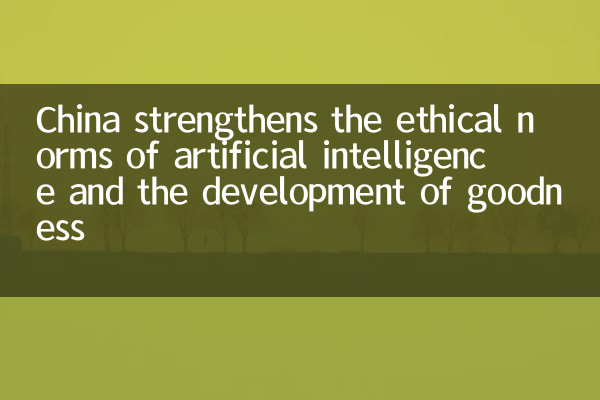China strengthens the ethical norms of artificial intelligence and the development of goodness
In recent years, artificial intelligence (AI) technology has developed rapidly around the world. As one of the leading countries in the field of AI, China has not only achieved remarkable achievements in technological innovation, but also began to strengthen the discussion and practice of AI ethical norms. In the past 10 days, the hot topics of "AI ethics" and "technology for good" have continued to ferment, reflecting the society's high attention to the healthy development of AI technology. This article will explore China's progress and future direction in the field of AI ethics through structured data and analysis.
1. Hot topics related to AI ethics in the past 10 days

| Ranking | Hot Topics | Discussion popularity (index) | Main Platforms |
|---|---|---|---|
| 1 | China releases the "Interim Measures for the Management of Generative AI Services" | 1,200,000 | Weibo, Zhihu, WeChat |
| 2 | Abuse of AI face swap technology has sparked privacy controversy | 980,000 | TikTok, B Station, Headlines |
| 3 | The Global AI Ethics Summit was held, and Chinese representatives spoke out | 850,000 | Twitter, LinkedIn, CCTV News |
| 4 | Discussion on the ethical boundaries of AI-assisted medical care | 720,000 | Dingxiangyuan, Hupu, Zhihu |
| 5 | The establishment of the Enterprise AI Ethics Committee | 650,000 | 36Kr, Snowball, Finance Network |
2. Core Measures for China's AI Ethical Standards
China's layout in the field of AI ethics is gradually improving, and policies and industry practices are taking a two-pronged approach. Here are the key recent moves:
| time | Action | Publishing agency | Key content |
|---|---|---|---|
| July 2023 | "Interim Measures for the Management of Generative AI Services" | The State Cyberspace Administration of China and seven other departments | Clarify the responsibilities of generative AI service providers and require content security and privacy protection |
| June 2023 | "Technology and Ethics Review Measures (Trial)" | Ministry of Science and Technology | Establish an ethical review mechanism for AI R&D projects |
| May 2023 | "Artificial Intelligence Ethical Risk Analysis Report" | Chinese Artificial Intelligence Society | Propose the top ten risk areas such as algorithm discrimination and data abuse |
3. Typical cases of technology-oriented goodness
While standardizing development, Chinese AI companies are also actively exploring practical paths for technology to be good:
| enterprise | project | Application areas | Social Value |
|---|---|---|---|
| Baidu | AI search platform | Charity | Helped more than 12,000 families reunited in total |
| Alibaba | "AI Translation Glasses for Hearing Impaired" | Help the disabled | Real-time voice to text, with an accuracy rate of over 95% |
| Tencent | AI-assisted early cancer screening | Medical | The accuracy of lung nodules recognition is 99% |
4. Future challenges and development directions
Despite China's progress in the construction of AI ethics, it still faces multiple challenges:
1.Risk of technology abuse: The supervision of technologies such as deep forgery (Deepfake) needs to be further strengthened;
2.International standards collaboration: It is necessary to promote global ethical consensus under the frameworks of G20, the United Nations, etc.;
3.Inadequate public participation: Ordinary people’s understanding of AI ethics still needs to be improved.
Experts suggest that in the future, we should make efforts from three aspects:
-Improve legislation: Accelerate the special legislative process of the Artificial Intelligence Law;
-Industry self-discipline: Promote enterprises to establish a normalized mechanism for ethics committees;
-Popularization of education: Provide compulsory courses in AI ethics in colleges and universities.
China is providing Eastern wisdom for global AI ethical governance with the idea of "focusing on both development and governance". As the head of the Ministry of Industry and Information Technology recently said: "The ultimate goal of AI should be to improve human welfare, not to create risks." This concept may become the core orientation of future technological development.

check the details

check the details